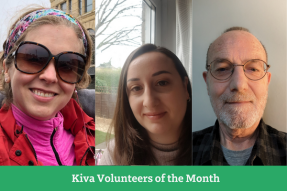Welcome to Nehalem, Oregon, a town full of hardworking men and women who have left their office careers for more hands-on work in rough fields and muddy waters. It’s become a Kiva community as well, with borrowers who have taken out loans for everything from irrigation equipment to restaurant renovation.
Patrick Rock, co-owner of local restaurant Salmonberry Saloon, is one of those individuals. He and his wife, Salmonberry co-owner Chantelle Hylton, left their jobs in the art and music industries to purchase the saloon and revive it to its former glory with the help of a Kiva loan.
Patrick’s parents were school teachers who moved to Nehalem, a coastal town in northern Oregon, during the Great Depression. “They opened a general store down in Brighton and they came here because you could eat here, whereas everywhere else was in the midst of the Great Depression,” Patrick said. “There was salmon, game, dairy, oysters, and timber.”
 The front of Salmonberry Saloon.
The front of Salmonberry Saloon.And as for the saloon? “We'd always driven by this place. I'd watched this place kind of deteriorate over the years. And my family always kind of wanted to own this place,” Patrick explained.
They were introduced to the rest of the community by Jared Gardner, the owner of Nehalem River Ranch, a pasture-based farm raising cows and pigs. As a Kiva trustee, Jared is known as the ultimate Kiva networker in the community, helping others set up loans and finding backers to fund them.
 Salmonberry's tacos are made with meat sourced from Nehalem River Ranch, another Kiva borrower!
Salmonberry's tacos are made with meat sourced from Nehalem River Ranch, another Kiva borrower!Jared introduced Patrick and Chantelle to Kiva Labs, a small business incubator program, where they could apply for a $25,000 loan through Kiva. Through communicating with other small business owners in the area like Jared and local patrons on Kiva businesses, Patrick and Chantelle made it happen and their loan was posted on Kiva.org to start fundraising.
“There's a lot of support among the Kiva community and those groups of people who encourage each other to help people in their final push [for funding],” Chantelle said. “And it was great. It happened when it needed to happen.”
Their $25,000 loan was powered by 308 lenders who were passionate and interested in the growth of the Salmonberry Saloon and coastal community.
In communities like Nehalem, businesses tend to be interconnected like the River Ranch and Salmonberry. The restaurant now serves tacos and other dishes with meat straight from the ranch -- a mutually beneficial relationship that’s both business and personal.
 Cows roam freely at the river ranch.
Cows roam freely at the river ranch.“Jared’s a networker and a creator. That's kind of his jam,” Chantelle praised. “He introduced us to everybody.”
Whether it’s a restaurant or a ranch, every business comes with its own challenges. Salmonberry is in the process of renovating its upstairs section in order to host large events in the winter, as there isn’t as much business without tourists coming through town. The River Ranch needs roof repairs in their barn before the rains really start coming in the early winter season.
In the end, it’s necessary to become a jack-of-all-trades to keep a small business running -- not just farming skills or management abilities.
“We're doing our own drag farming, our own marketing and distribution, all of that,” Jared explained. “We have to do all the system’s accounting, bookkeeping and advertising. The transportation logistics have become more difficult as we’ve grown.”
 Jared manages Nehalem River Ranch, 24 hours a day and 365 days a year.
Jared manages Nehalem River Ranch, 24 hours a day and 365 days a year.Jared has a friend named Sam who helps on the ranch for about 20 hours a week and Jared’s wife and children occasionally do some barn work, but otherwise -- it’s all him.
Patrick and Chantelle face many of the same challenges being somewhat new to the restaurant industry and running the saloon themselves. “We wake up from panic nightmares about the restaurant, to our lovely cats who cheer us up,” Chantelle joked.
“Delivery starts in the morning from places like the River Ranch. Then the kitchen crew comes in, and the front of house crew comes in, and then it just starts rolling. Then it's picking up orders or putting out fires,” Chantelle said.
 Salmonberry sources most of their food from local small businesses!
Salmonberry sources most of their food from local small businesses!Running a small business, owners of both the ranch and the saloon agreed, is always a learning process. Like Patrick and Chantelle and many other American Kiva borrowers, Jared wasn’t always in this line of work or part of a small business.
He previously worked as an anthropologist in the jungles of Papua New Guinea, then in finance in a high-rise, and then in public policy. As a policymaker, he learned more about community funding programs like Kiva. When his wife became pregnant and they became more conscious about food sourcing, they moved out of the city and running the River Ranch.
Jared’s Kiva loans supported the business through historical floods, a wild drought, and two sick bulls.
“A zero-interest loan is a fantastic opportunity to be able to finance something that we might not otherwise qualify for immediately. We only had 1 year and that was largely a loss because of how much we had to put into repairing fences and fields and all that [after the disasters]. So to have that flexibility of crowdfunding our own financing was huge. Made a big difference,” Jared said.
 Both pigs and cows are raised at Nehalem River Ranch.
Both pigs and cows are raised at Nehalem River Ranch.At this point, Jared says, Kiva borrowers and lenders have brought over $100,000 in economic change to the community, specifically through the creation of new jobs (like servers at the Salmonberry) and greater profit (with Jared providing food options to many local businesses).
“The local economic developer agencies are like, ‘Whoa, you guys have brought as much as we have in that time period,’” Jared says. “And it’s way more strategic and impactful: $5,000 here, $10,000 there. It goes a long way for small new producers.”
Supporting our U.S. and DSE borrowers is so important, and we can't do it without your donations. Since 100% of the money you lend on Kiva goes to the field, Kiva relies on optional tips and donations from individuals like you to cover our costs. Donate here!
PREVIOUS ARTICLE
A global perspective at Kiva's headquarters →NEXT ARTICLE
4 reasons to donate to Kiva this holiday season →













